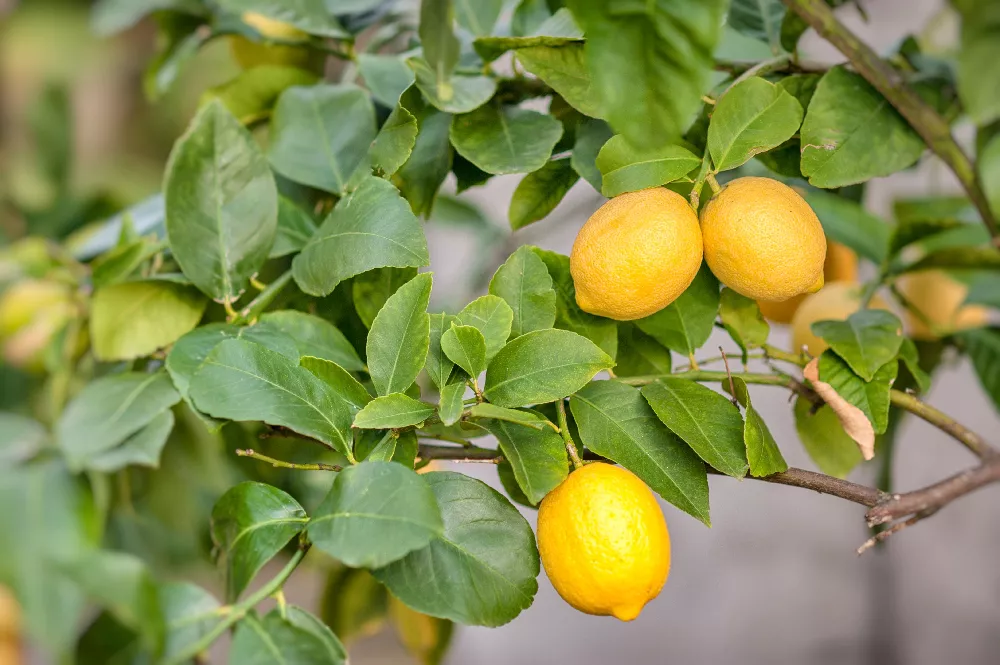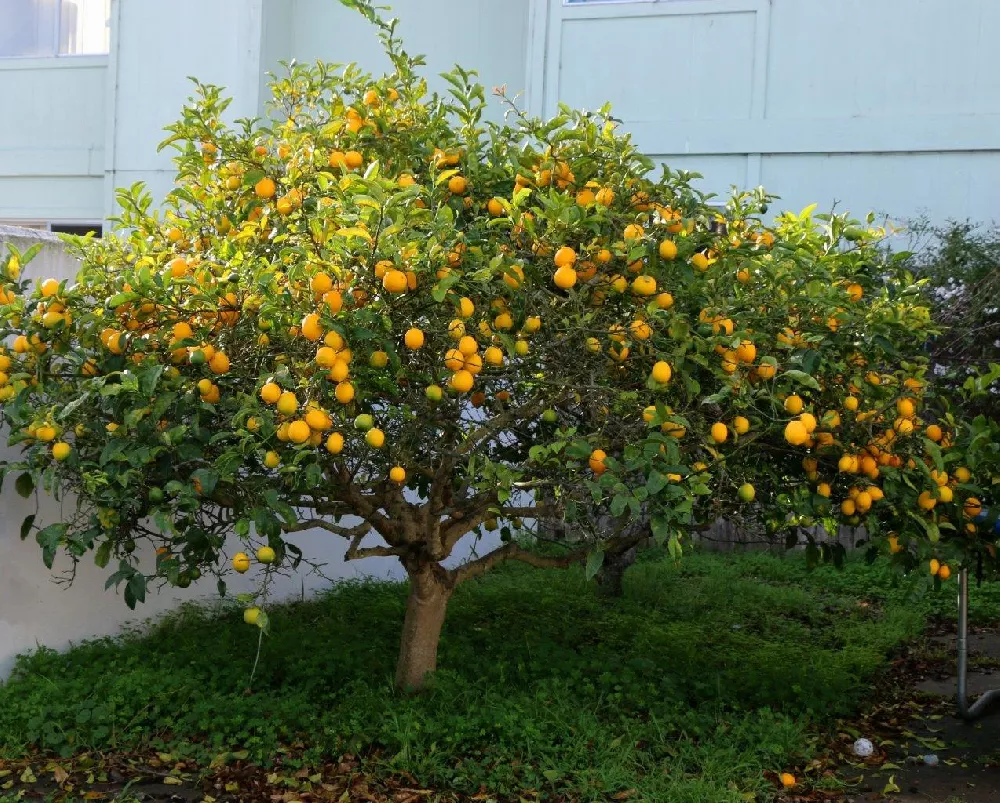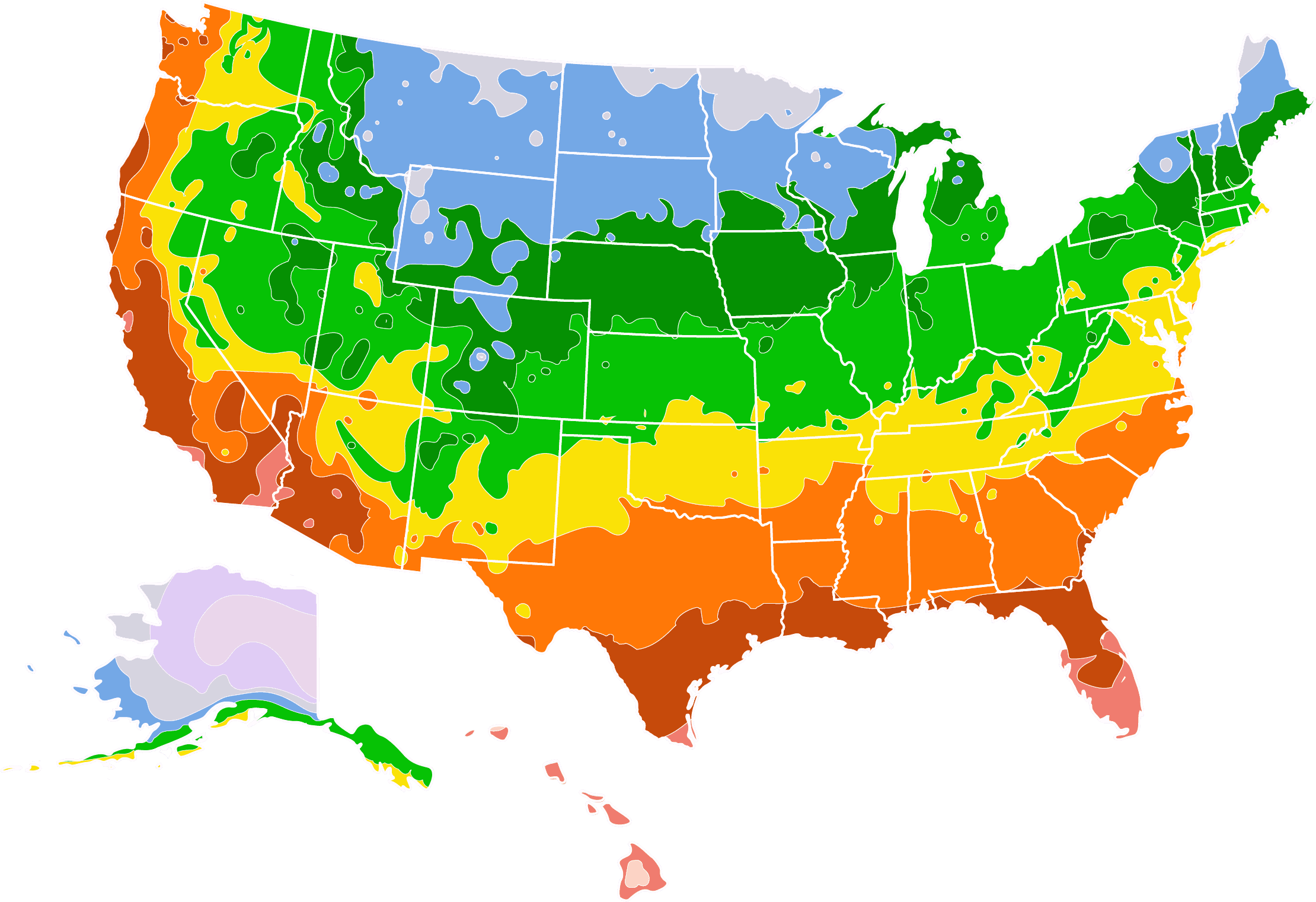- Home >
- Lemon Trees >
- Organic Meyer Lemon Trees
Organic Meyer Lemon Trees for Sale
The beloved Meyer Lemon (Citrus × meyeri) is highly prized for its sweet fruit that is said to be a combination of lemon and mandarin orange. The beauty of the dark green foliage, fruit, and fragrant flowers make it ideal as a container plant or planted in the ground. It requires little care. Here are a few more facts about the Meyer Lemon:
- The tree will fruit within a few years.
- Beautiful white, highly fragrant flowers intermittently bloom.
- It’s disease resistant.
Enter your zip code to find nearby stores that may carry this plant.
Plant Care
Sunlight

Meyer lemons need at least 6 hours of direct light per day, but they will be even happier with 8 or more hours of full sun.
Watering
When young, your Meyer lemon needs deep watering once a week, and more during hot weather. Once established, taper off to occasional, deep watering.
Fertilizing

Fertilize regularly with a product formulated for citrus trees that includes higher levels of nitrogen.
Planting and Care
Planting instructions
Use a five to seven gallon container with drainage holes. Make your own potting mix with equal amounts of perlite, sand, bark, and peat. Partially fill the container with the mixture, add your lemon tree, and fill with the remaining mix. Water well. Place on a patio or in front of a window for full sun.
Outdoor planting (USDA hardiness zones 8-11) should be done in early spring or late winter. The planting site should have full sun and ample room to allow growth. The soil should be loamy (more sand, less clay components). If not, you may need to amend it. Plant your tree and water well.
Watering and nutrients
Lemon trees need moderate watering, especially when young. Water about six inches deep weekly. However, in hot weather, you may need additional waterings. As the tree matures, slow and deep waterings work best. Using non-porous containers for planting prevents the soil from drying out too quickly, but be sure the container has holes to allow water to drain off, as soggy soil can lead to root rot.
Frequently fertilizing the tree is a must. Lemon trees require higher levels of nitrogen.
Citrus trees do best with a fertilizer specifically formulated for those plants. We recommend using Jack’s Classic 20-10-20 Citrus Feed (follow the container directions).
Pollination
Meyer Lemon Trees self-pollinate. The breeze and pollinators fulfill the role of ensuring your tree gets the necessary pollen to produce fruit. However, if your tree is indoors, you will need to pollinate it. Simply gather a tiny bit of pollen in a flower (using a tiny paintbrush) and carry the pollen over to another flower and deposit it.
Pruning
Light pruning is necessary to keep the size of your lemon tree manageable. It also encourages the growth of stronger branches to withstand the weight of the lemons. But take care while pruning — a prick from a citrus thorn stings. Start with a clean, sharp, disinfected pair of shears. If your tree is planted outdoors, remove shoots (along the trunk) down near the ground. Whether your tree is in a container or the ground, trim branches that cross over another as well as those with an inward growth habit. Also, trim away branches growing straight up and those that do not produce fruit after a full season.
Pests, diseases, and animals
The Meyer Lemon is considered disease resistant. However, root rot and fungal infections can impact its health and vitality. Root rot can be prevented by being careful not to overwater your tree. Fungal infections such as canker and greasy spot can be treated with Bonide’s Copper Fungicide.
Meyer Lemon Trees are also susceptible to aphids. Black sooty mold can form when aphids are present. Wash the mold off with a water sprayer.
Lemon trees are toxic for pets. The entire plant contains psoralen, limonene, and linalool, which when ingested can cause a variety of medical issues. Psoralen affects the skin and eyes. Limonene causes organ failure, and linalool causes organ damage/failure.
Harvesting
Typically the tree will bear heavy fruit about twice a year (early spring/fall.) Lemons take about six to seven months to mature. They are ripe when the color is a vibrant yellow. To remove, use a pair of disinfected shears and cut it off at the stem. Twisting the fruit off causes damage to the branch. A Meyer Lemon has a shelf life of one week.
Fun Facts

FAQs
Do lemon trees experience shock when moving them from outside to indoors?
Can lemons be refrigerated to extend their shelf life?
Lemons can be kept at room temperature for up to one week before they begin to spoil. Placing them in an air-tight bag in the refrigerator extends their freshness for up to three months. An alternative option for keeping your Meyer Lemons fresh is to store them in a jar full of water. As a general rule, never store lemons (at room temperature or in the refrigerator) near other fruits such as bananas, apricots, or peaches. Those fruits emit ethylene that causes lemons to spoil.
Does this tree have any known pest problems?
Aphids, mites, scale, and whiteflies are attracted to lemon trees. Symptoms of their presence include leaves dropping off, leaves turning brown or curling, yellow spots, or white specks. Preventing pests is the best form of treatment. Remove decayed/dead debris (leaves, fruit, branches) as insect eggs and fungal spores can survive in leaf litter and debris. Ensure adequate airflow throughout the plant through routine pruning. Crowded overgrowth encourages disease and pests. Effectively treat an active pest problem with neem oil or pyrethrin.
Are there other uses for the lemons if I do not eat them?
Many people grow the Meyer Lemon Tree for its beauty even though they do not care for lemons. Lemons can be used in a variety of ways. Of course, we know their value in cooking, but lemon juice makes an excellent bug repellant and prevents the browning of apples. Dried lemon peels are good fire starters to use when camping. If you need buttermilk, add one tablespoon of lemon juice to your milk and allow it to sit for a few minutes.
Why is this tree called an “USDA Organic” tree?
This tree is a hybrid of two species (lemon, mandarin orange) native in China. It was introduced to the U.S. by Frank Meyer, who was with the USDA. It’s a grafted plant on the rootstock (trunk) of a Yuma Ponderosa Lemon. It has been organically propagated and grown to provide chemical-free fruit.











